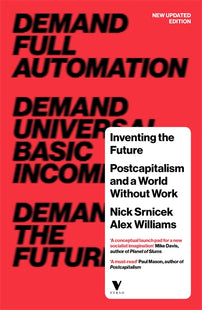Global 5G Internet: The World’s First ‘Universal Basic Service’?
Last month, Elon Musk's SpaceX launched a prototype of its Starlink satellite. With them, Musk hopes to create the world's first global Internet service. But, should space be merely a new arena for the dominance of global mega-corporations? And could we repurpose this new infrastructure for emancipatory ends? In this article, Aaron Bastani argues that the repurposing of this vital service could help socialists begin dreaming as big as the oligarchs.

Last month SpaceX, the market leader in private space transportation, oversaw the launch of an altogether different cargo. To date, most of SpaceX’s missions have involved shuttling payloads through space for space agencies and private clients. Yet, its most recent venture was to launch prototypes for its own project ‘Starlink’, whose aim is to provide global 5G Internet through a constellation of 12,000 satellites.
That project, which by itself would represent more than double the number of satellites currently in the Earth’s orbit, illustrates how far the space industry has come. Until eleven years ago, no private company had successfully launched a first stage booster into space – something only achieved by a handful of countries.
Yet, that elite set of nations was joined in 2008, when SpaceX successfully launched its Falcon 1 rocket at the fourth time of asking. Since then the company has enjoyed a litany of breakthroughs, most memorably the 2015 landing of an orbital first-stage rocket that was subsequently re-used. Such a development meant one thing: the space industry was about to get cheaper, with reusable rockets reducing overheads by an order of magnitude.
Once upon a time it was the rocket that was the expensive part of putting something into orbit. Now the opposite is the case, with larger satellites sometimes costing three times as much to build as the price SpaceX demands to launch them. This trend will only continue with the emergence of a new range of actors, led by the likes of RocketLab and Relativity Space. Twenty years ago informed opinion believed a private space industry might never happen. Now the sector’s parvenues are looking to provide low cost launches on a weekly basis.
Yet, more competition means an increasingly saturated field. If it is to continue growing its already substantial revenue, then SpaceX must continue to innovate. Starlink, whose satellite infrastructure it intends to build and launch with its own technology, will be the world’s first globally available Internet service. However, while SpaceX may have comparative advantages over their rivals in creating a space-based 5G Internet, they are not alone with competitors including Amazon, Samsung and OneWeb looking to do the same.
The fact so many companies are intent on building something that, until recently, belonged to the world of science fiction, is because cost of entry is collapsing. Last year SpaceX publicly stated that Starlink would cost somewhere between $10 and $20 billion. While that might sound a great deal its roughly half the amount the UK government received after auctioning its 3G spectrum in 2000 ($35 billion).
For whoever wins the new space race, the rewards are staggering. The mere possibility of success already reflected in SpaceX’s rising value last week as it overtook Tesla’s vaulation for the first time. Now valued at $33 billion it, unlike the automotive upstart, is not publicly listed, with founder Elon Musk owning around half the company’s equity. Musk himself estimates that Starlink could generate as much as ten times SpaceX’s present revenues, built as they are on launching payloads into space. Presently such revenue is thought to be around $2 billion. While its order book is growing Musk expects a ceiling of around $3 billion. Starlink - by comparison - could generate annual revenues closer to $30 billion.
Perhaps we should be sceptical about some of Musk’s claims, the South African’s hyperbole is by now well known. And yet, with the cost of entry to the privatized space industry collapsing, the possible revenues do indeed appear huge. A space-based global Internet has the potential to offer a better service at a reduced cost, all while offering countries in the Global South the service without the expensive infrastructure that more advanced economies adopted. Yet, the privatized nature of the service raises several important questions.
Firstly, how is it right that a single company, half of which belongs to just one billionaire, should own something of such critical importance? Secondly, what sense is there in multiple businesses attempting to provide the same infrastructure? Amazon are planning to launch 3,200 satellites for their system, while OneWeb is aiming for as many as 1900. This is the equivalent of building multiple toll bridges next to one another at the same part of a river.
Thirdly, given the technology underpinning all of this has been publicly-funded, from Sputnik to SpaceX’s own NASA contracts, not to mention the investment which made the internet possible at all, it seems strange that further innovation is set to make billionaires richer still. Public funding of the International Space Station alone totals some $150 billion, with a similar figure holding for the Apollo Missions in today’s prices.
Yet now SpaceX, a private company, aims to create infrastructure - only possible because of those prior investments - over which it has a monopoly and rents out, including to the US consumer, for an extraordinary rate of return. This represents a major step, as I outline in Fully Automated Luxury Communism, in applying the logic of neoliberalism to resources and value beyond our planet. Here the imperative is much the same as on Earth: socialise costs and losses, and privatise the gains.
Perhaps surprisingly for an industry that is the definition of a future-oriented modernity, the past offers an alternative. The 1967 Outer Space Treaty states that the use of outer space is the ‘province of all mankind’, a theme touched on by President Eisenhower in a 1960 speech when he proposed that the world ‘press forward with a program of international cooperation for constructive, peaceful uses of outer space under the United Nations’.
The tendency to what I call ‘extreme supply’ - where the key inputs to everything, from labour to information and energy, get cheaper every year - explains how an industry which didn’t exist two decades ago is on its way to creating a space-based internet. Once it has done so, it will constrain such abundance within a system of rationing, monopoly and rents. This is symptomatic of how contemporary capitalism generates returns; through the constraint of plenty rather than the production of it.
And yet as I outline in Fully Automated Luxury Communism there is an alternative. Extreme supply can underpin the provision of universal basic services (UBS) like healthcare, education, transport and housing – where each are made freely available to all. While these will be administered at the level of the nation-state, it makes sense that the Internet - increasingly the backbone of global society - becomes the first internationally guaranteed UBS, paid for by the wealthier countries of the Global North and administered, as Eisenhower might have suggested, by the UN’s International Telecommunications Union (ITU).
Such a proposal isn’t an effort to turn back the clock or wishful naivety. A decade ago it was no less likely than the idea that a single company would administer such vital infrastructure - which is what is now unfolding. It’s time socialists began dreaming as big as the oligarchs. If we don’t they will determine the 21st century, and with catastrophic consequences.
Aaron Bastani is co-founder and Senior Editor at Novara Media and has a doctorate from the University of London. His research interests include new media, social movements and political economy. He has written for Vice, the Guardian, the London Review of Books and the New York Times and regularly appears as a commentator on the BBC and Sky News.
[book-strip index="1" style="display"]


